Hiking can be a physically demanding form of exercise and particularly if you are planning to do long hikes, what you put into your body becomes more and more important.
Making sure that you are able to fully enjoy your hike requires a lot of different preparation, from good equipment to a well-planned route and favorable weather, however, there is one key element to a successful hike that many people overlook.
This is your diet and it’s absolutely critical to make sure you get this right so that you can start your hike in the strongest way possible, and carry that momentum throughout your journey.
Whether you plan to do a multi-day route or a day hike, what you eat before, during, and after a hard day of walking will make a huge difference in how your body recovers, how easily you’re able to tackle any difficulties, and how much you enjoy the overall experience.
We’re going to look at what you should consider eating before you set off, as well as great options for snacks and food while hiking and afterward to make sure you’re able to fuel your body as efficiently and effectively as possible, helping you to perform at your very best and get the most out of your nutrition and your body.
Before the Hike
Making sure that you eat enough before you hike and are fueling your body up with the right nutrients is absolutely essential to ensuring a successful hike.
Skipping a good pre-hike meal or not taking into consideration how your nutrition will affect your body is a sure way to end up causing yourself a variety of problems.
These problems could range anywhere from exhaustion and fatigue to injury, cramping, dehydration, nausea, and collapse.
Needless to say, while hiking any one of these potential outcomes could be deadly, endangering yourself and your fellow hikers.
This makes proper food preparation and planning as critical as bringing the correct equipment, planning your route, and knowing the prevailing and expected weather conditions, and shouldn’t be taken any less seriously.
To this end, there are a few important things to consider when planning your pre-hike meal.
First and foremost, you want to stay hydrated whatever it is you eat because digesting food takes water, and not staying hydrated is one of the key causes of cramps and dehydration but often these issues aren’t immediately apparent.
In terms of actual food, a mix of complex and simple carbohydrates, protein and fiber are all important parts of a pre-hike meal.
Simple carbohydrates such as pasta, spaghetti, or potatoes will give your body a huge amount of easy to break down sugars and energy which will help you start your hike with a lot of energy, however, these carbohydrates are often used up quite quickly and are seldom enough to keep you powering through a whole day of hiking.
To supplement this early energy boost, complex carbohydrates such as wholemeal bread or oatmeal are a great source of slow-burning carbohydrates which release energy in a much more calculated and deliberate fashion will help your body continue to work hard once it has burned through the simple carbohydrates of pasta or biscuits.
With the core energy sources catered for, a good source of protein is essential for a few reasons, the chief one among them being that it helps stave off feelings of hunger and will help your muscles recover more quickly in the hours and days after your hike is completed.
Protein is much harder for your body to digest than carbohydrates, so protein fills us up for longer and can help us stave off nausea and the pain of hunger.
Protein can also be found quite easily in a variety of foods, and not all of these are meat-based.
You can just as easily find protein in nuts, beans, and pulses and these are all great alternatives to traditionally protein-based foods such as eggs, chicken, beef, or pork.
Finally, a good source of fiber and vitamins is key to maintaining your health and making it easy for you to go to the toilet when you’re away from civilization.
Vegetables and salads are great choices to cater to these needs, and are absolutely essential to a balanced and healthy diet and proper bodily function, particularly under the strain of a hike.
On the Trail
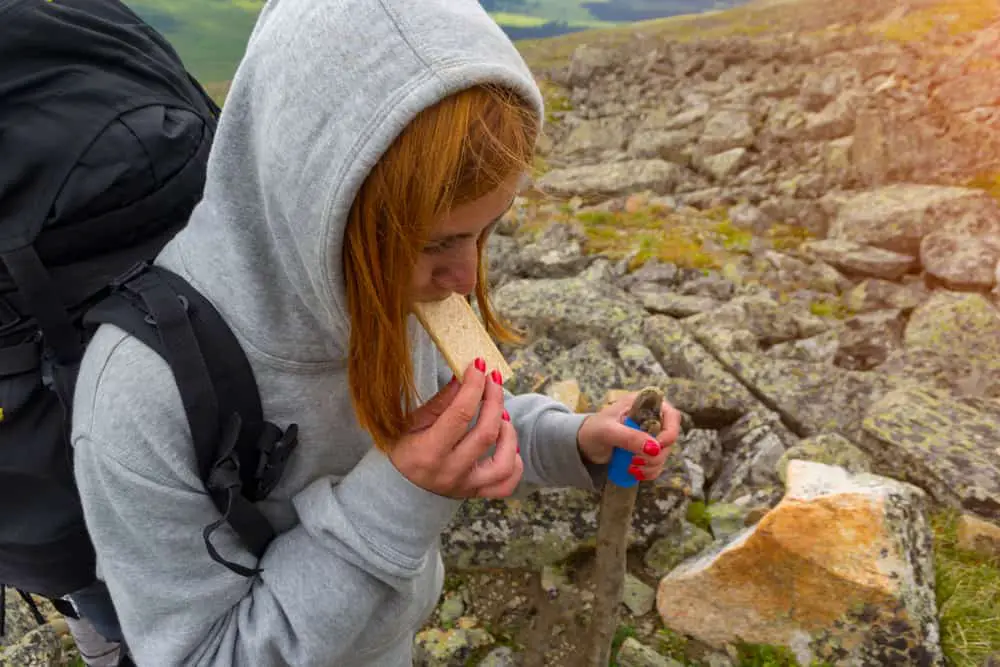
While your pre-hike meal prep is very important, it’s important to bring some snacks or food along with you depending on how long your planned hike is.
If you’re going on a day hike, there are several great and natural options from trail mix to assorted nuts and fruit which will all keep very easily and provide a perfect blend of carbohydrates to boost your energy levels when you need to, and protein to stave off the sensation of hunger.
No one wants to be that person who hasn’t prepared properly and ends up nagging for a nibble of someone else’s lunch, so make sure you take ownership of your own needs and bring a little extra just in case things go wrong.
A bag of jelly beans and some mountain dew is absolutely unacceptable and may give you a short burst of energy, but it will also leave your sugar levels crashing and your body starved of essential nutrients it needs to be able to function properly.
Bring them as a treat if you like, but don’t replace quality foods with processed junk!
After the Hike
After the hike, your body will naturally be depleted and suffering from the duress it has been under. Aching is very common and it’s surprising how much a good after-hike meal can solve these issues.
A protein-heavy meal will help give your muscles all the nutrients they need to start recovering.
Something warming like stew or a roast is a tasty and nutritious way to reward your body and mind for pursuing and completing your latest challenge.
Hydration
The importance of proper hydration cannot be overstated. By the time you feel the sensation of thirst, you’re already suffering from early-stage dehydration, meaning your brain and muscles are not able to perform at their best.
A lack of water can cause cramping, strains, and stretches as your muscles struggle to flush lactic acid and process energy, so stay on top of your hydration levels before, during, and after!
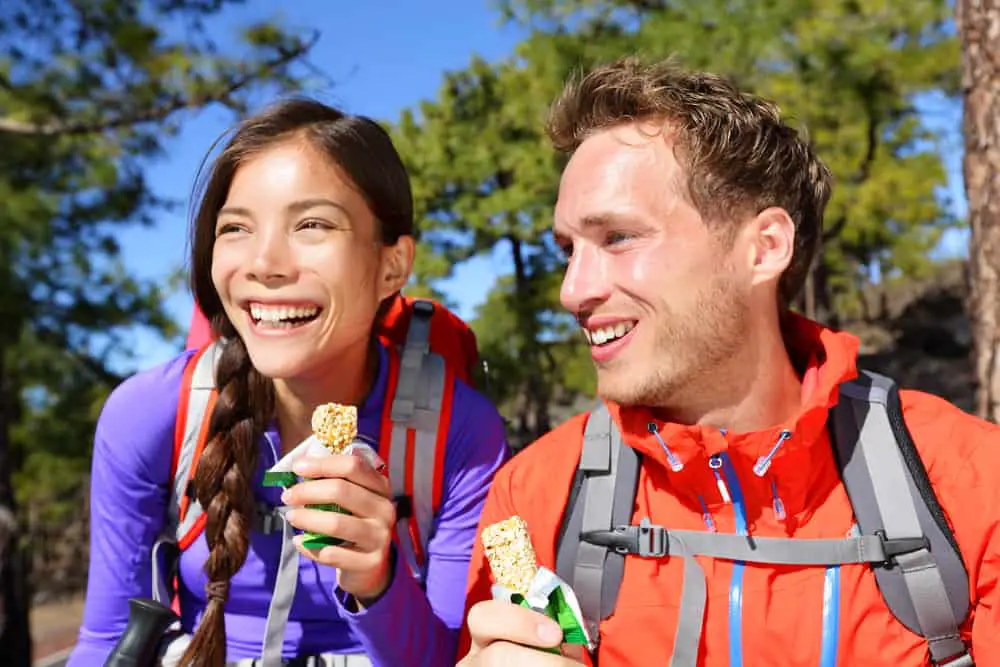


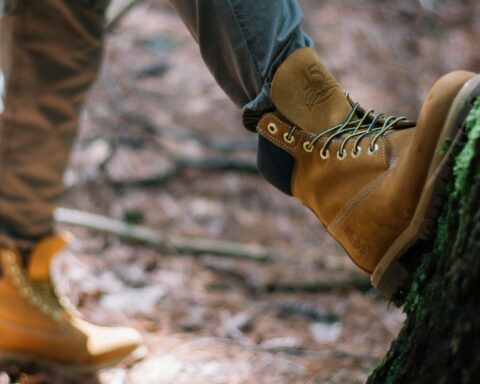
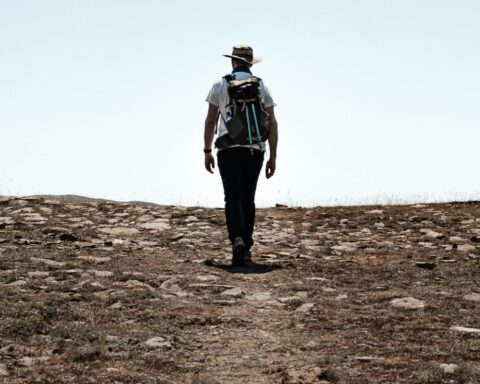
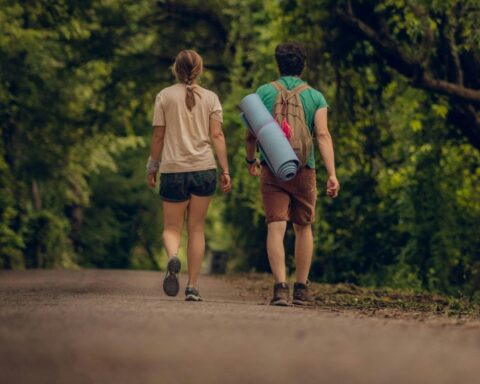
[…] Okay, so before you just stuff your bag with whatever you feel like eating – it’s important to think of some things that might hinder your experience and cause problems. Further, as well as thinking about what you can bring with you to eat on your hike, it’s worth considering what you should eat before you hike. […]